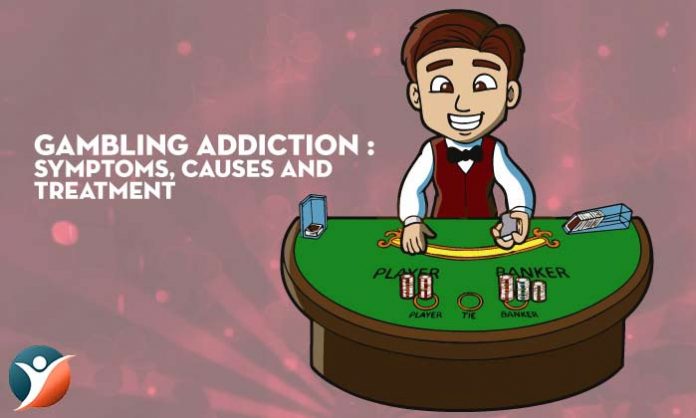
Gambling which starts as a recreational thing or just for fun has the potential to get you hooked to it. How quickly gambling can take grip on a person and turn that person into a gambler is baffling. Gambling can turn into addiction a mental health condition that is believed to be one among various impulse-control issues and has a number of similarities with obsessive compulsive disorder (OCD).
However, lately it is understood to be almost similar to all other addictions. The kinds of gambling that people who have this disorder may engage in generally vary, as number of games are available. Betting on any sports, purchasing lottery tickets, playing poker, roulette or slot machines are just a few of all the activities in which binge gamblers indulge. The venue for people with gambling addiction also varies accordingly. While most people prefer gambling in a modern casino, the rate of Internet or on-line gambling addiction is rapidly increasing with the increased Internet use. Alternatively, few compulsive gamblers might also engage in risky investing in the stock market. Gambling addiction is also known as pathological gambling or compulsive gambling. Fortunately, there are treatments to help getting over this addiction. Read on to know more about gambling addiction.
Table of Contents
- Gambling Addiction Statistics
- Signs and Symptoms of Gambling Addiction
- Risk Factors for Gambling Addiction
- Causes of Gambling Addiction
- Prevention of Gambling Addiction
- Diagnosis of Gambling Addiction
- Treatments for Gambling Addiction
- Possible Health Complications Due To Gambling Addiction
- Conclusion
Gambling Addiction Statistics
American citizens who regularly gamble socially and also qualify for having a gambling addiction usually range from 2%-3%. This itself indicates that millions of people are affected in the United States alone. Other crucial statistics on problem gambling reveals that gambling addiction affects around 1% of global world population. Teens usually tend to develop this disorder at a rate that is almost twice that of the adults.
Males are more likely to develop a gambling addiction at a much higher rate and at relatively younger ages than females. But, women make up almost one-quarter of all the compulsive gamblers. Unfortunately, women’s gambling symptoms also tend to worsen much faster.
Problem gambling commonly indicates gambling that has more than one symptom but less than minimum five symptoms required to qualify for diagnosis of pathological or compulsive gambling. [1] Binge gambling can be defined as a sub type of pathological gambling that includes problem gambling but only for discrete time duration. This gambling behavior is bit different from classic gambling addiction, wherein a person involves in excessive gambling behavior on a regular basis and also has persistent thoughts about gambling when not even engaged in gambling.
Let’s learn about the signs and symptoms of gambling addiction.
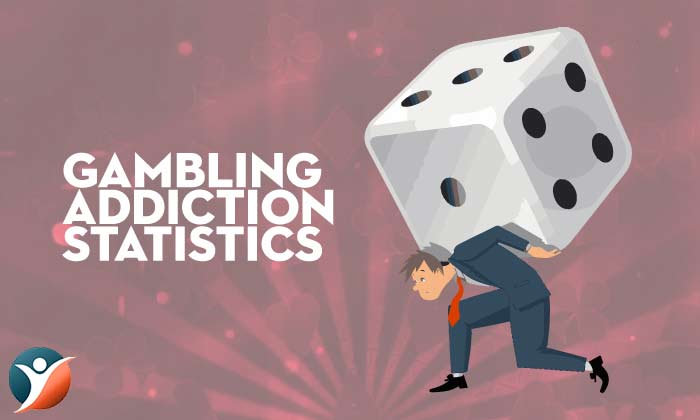
Signs and Symptoms of Gambling Addiction
Pathological or compulsive gambling includes constant and recurring problem gambling that also includes few of the below mentioned symptoms; that are not due to any other mental health issue:
- Having a preoccupation with gambling through reliving previous gambling experiences, planning for future experiences and/or figuring out ways to get hands on money for financing gambling.
- Needing more and more money for gambling so as to achieve the required level of gambling enjoyment.
- A number of unsuccessful attempts for reducing or stopping betting behaviors.
- Becoming irritated whenever trying to reduce or not indulging in gambling
- Gambling for escaping real problems such as to relieve anxiety or depression
- Engaging in gambling after losing money to recoup all the losses
- Lying to loved ones, family, mental professionals, doctors or others to significantly hide the extent of your gambling behavior
- Committing crimes (such as fraud, stealing or forgery) or securing illicit loans to finance your gambling
- Risking crucial relationships, job, or other important opportunities for gambling
- Depending heavily on others for giving you money to resolve the dire financial crisis that is a sole result of gambling.
Let’s find out the risk factors that may increase your risk of developing gambling addiction.
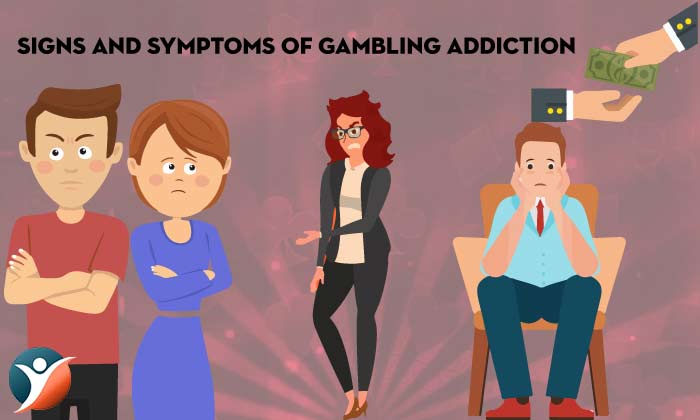
Risk Factors For Gambling Addiction
Risk factors that increase your risk of developing pathological or compulsive gambling include the following:
- Schizophrenia
- Mood problems,
- Antisocial personality disorder
- Alcohol Use Disorder (AUD)
- Cocaine addiction
- Individuals who generally have a lower level of serotonin in their brain are also believed to be at much high risk for developing compulsive or pathological gambling as compared to the others.
Let’s learn about causes of gambling addiction.
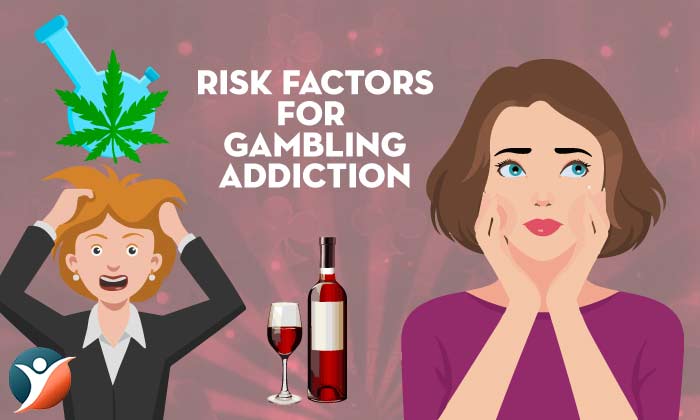
Causes of Gambling Addiction
It is important to understand that there is generally no one particular cause for pathological or compulsive gambling. Some exceptions include the observation that some individuals who are on certain medications which help in treating Parkinson’s disease or restless leg syndrome are seen to usually develop certain impulse-control disorders such as compulsive shopping, gambling or compulsive sexual behaviors.
This strange connection involves the enhanced activity of the chemical messenger known as dopamine in a person’s brain. Another instance where this compulsive gambling might have a single cause is in the bipolar disorder as exorbitant spending, and compulsive gambling, might be a symptom of mania that is a result of bipolar disorder.
More commonly, gambling addiction like a number of other emotional conditions, is believed to be a result of several biological vulnerabilities, thinking patterns, and social stressors. There are other elements as well, that somehow increase an individual’s chances of developing gambling addiction.
People who develop compulsive gambling generally are novelty seekers, feel dissociated, relaxed, or easily aroused while playing video games or gambling. Research has shown that individuals who are facing money problems, won huge amounts of money initially into gambling, suffered a major loss (such as divorce or a job loss), or are very lonely are at much increased risk of developing compulsive or pathological gambling. A relatively easy access to gambling (such as living near cities that have ample gambling resources like Las Vegas or Atlantic City), belief that they will almost win at every gambling spree and failing to keep record of money lost and won at gambling. All of these are risk factors that somehow increase a person’s risk of developing compulsive gambling.
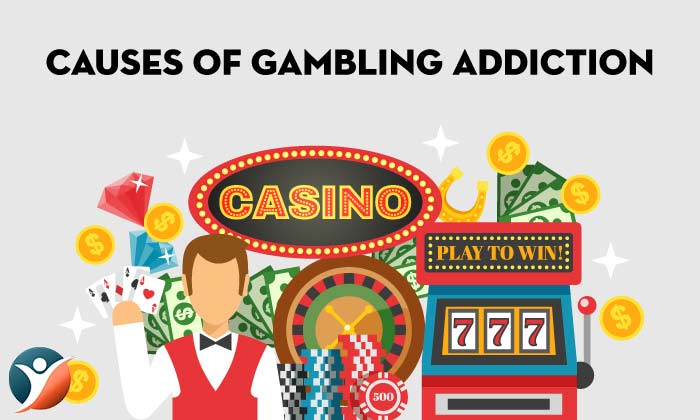
Prevention of Gambling Addiction
Besides alleviating the risk factors for pathological or compulsive gambling, educating people about the certain warning signs for this mental disorder are key components in prevention of gambling addiction. Warning signs include talking too much about gambling, bragging excessively about your gambling wins, poor performance at work, unexplained absences from school or work, frequent mood swings, stealing or borrowing money. It is, however, possible to prevent yourself from being in the clutches of gambling addiction.
Let’s learn how gambling addiction is diagnosed.
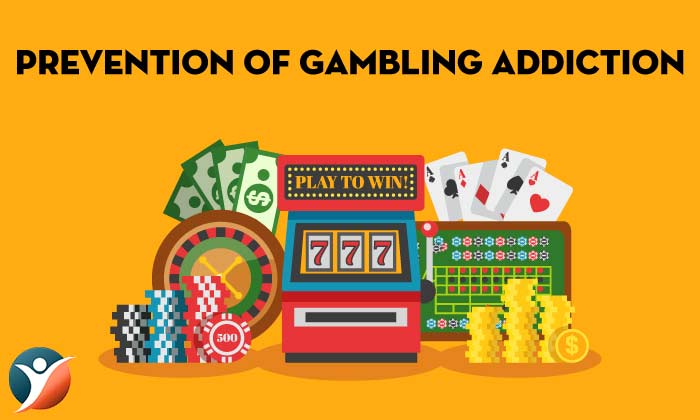
Diagnosis of Gambling Addiction
The first major step for obtaining suitable treatment for gambling addiction is accurate diagnosis, that requires a comprehensive physical and psychological test to determine if the person has gambling addiction or not. Since few medical conditions can make an individual to develop certain unreliable, impulsive behaviors, including engaging in excessive gambling, your examining doctor would figure out the problem through a physical examination, an interview and suitable laboratory tests, along with a full mental-health exam. A full diagnostic evaluation involves complete history of individual’s symptoms, wherein a practitioner may ask the below mentioned questions:
- What was your age when you started gambling for the first time?
- How much time (how long and how often each time) have you spent in gambling or being preoccupied with gambling?
- How much have you spent or lost in gambling?
- What types of things you indulge in to finance your gambling?
- Do you always feel like gambling?
The doctor may also ask about your alcohol and drug use and whether you have ever had thoughts about committing suicide or death. Further, the family history generally includes information regarding whether close family members have had ever faced a gambling problem or some other mental-health issues, and if they received a treatment, what did they receive and which drugs were actually effective versus the ineffective drugs.
A diagnosis will also include a mental-status exam to know if the patient’s thought pattern, speech, mood, or memory is affected, as this generally happens in various cases of mental disorders. As of now, there is no specific laboratory test, X-ray or blood test that can correctly diagnose this mental condition. Now, let’s learn about various treatments that are available for gambling addiction.
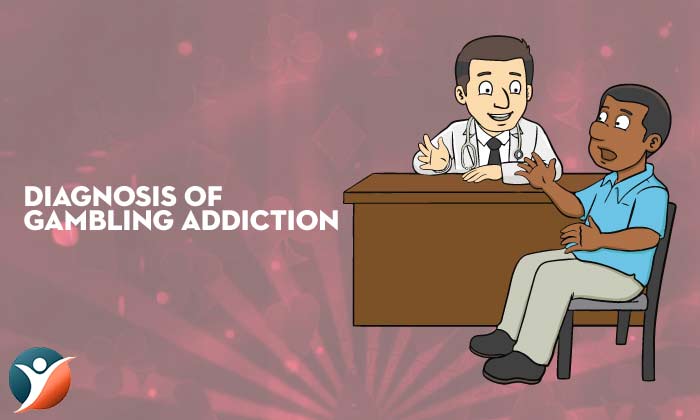
Treatments for Gambling Addiction
There is no standardized treatment for getting rid of pathological or compulsive gambling, many people with gambling addiction join the Gamblers’ Anonymous (GA) to learn how to stop engaging in the compulsive gambling behaviors. The 8% one-year gambling abstinence rate that some sort of medical intervention tends to bring out, is much improved when GA is considered along with psychotherapy by a trained professional. This becomes sure when the cognitive behavioral treatment (CBT) is given as psychotherapy. Drugs that are significantly helpful in decreasing a person’s urge to engage in gambling or the thrill it provides include antiseizure drugs like carbamazepine and topiramate, mood stabilizers like lithium, medications taken for addressing addictions like naltrexone and antidepressants such as clomipramine and fluvoxamine.
Psychotherapy has proved to be more beneficial than any other medications used for treating this mental disorder so far. Financial or debt counseling might also prove important aspect of care provided to people with gambling addiction.
People who have engaged in illicit behaviors in the year prior to their treatment generally have more serious symptoms of this mental disorder and may have more gambling linked debts as compared to the people who haven’t engaged in any illegal activity during past one year. It is hence believed that people who engage in breaking legal rules in the prior year before their treatment begins may need more intensive treatment for longer durations, at times even needing residential or inpatient treatment, commonly known as a rehab.
Another important statistic to consider for treating gambling addiction is that, around 70% of individuals with this disorder generally have some or other psychiatric problem as well. Hence, it is not at all enough to just treat the gambling addiction but also all other coexisting mental conditions (such as alcoholism or substance abuse issues, mood disorders or a personality disorder). All these co-existing issues must be addressed as well such that the patient may have a speedy recovery from all the health conditions. It is also essential to research about how can a person’s culture will play a role in treating the problem gambling.
Few researches have explored the effectiveness of home remedies in treating gambling addiction. Some home remedies that are being explored to treat this disorder are considering glutamate, consumption of a healthy diet and certain aromatherapies.
Now, that you know about the available treatments, let’s know the health complications that may arise due to gambling addiction.
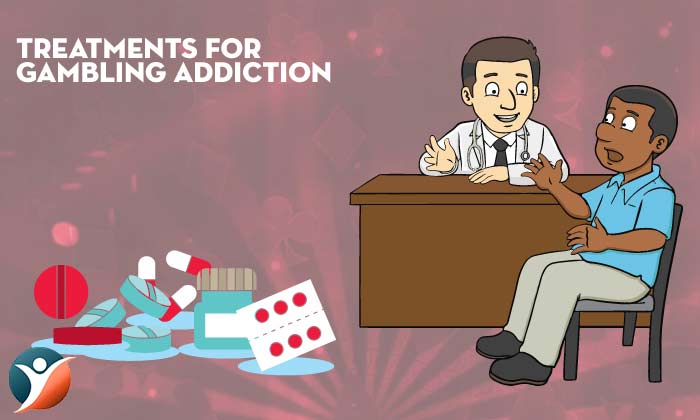
Possible Health Complications Due To Gambling Addiction
Almost one-third people who suffer from compulsive gambling might recover from this disorder without receiving any medical treatment. The potential adverse effects that pathological gambling can wreak on a patient’s life and people close to him or her clearly show that gambling abstinence clearly outweigh the possible health complications. Approximately $5 billion is spent on gambling every year, in the United States, with people who have gambling addiction accruing hundreds to thousands of dollars in the debt. Adverse effects that pathological gambling can have on a patient includes financial problems such as being in high debt, bankruptcy, poverty, to a number of legal problems leading to theft, prostitution, wanting, planning, or committing suicide.
Many of the compulsive or pathological gambling sufferers also experience stress linked medical issues such as insomnia, stomach ulcers, gastrointestinal problems, persistent headaches and muscle aches.
Gambling addiction may also lead to multitude of negative impacts on a patient’s family. Statistics have indicated that families of people who have gambling addiction are more vulnerable to experience child abuse and domestic violence.
Children of people who suffer from problem gambling are at considerably higher risk of depression, substance abuse and behavior problems. One of the major challenges of treating compulsive gambling is that around two-thirds of people who begin some kind of treatment for this mental disorder discontinue their treatment prematurely.
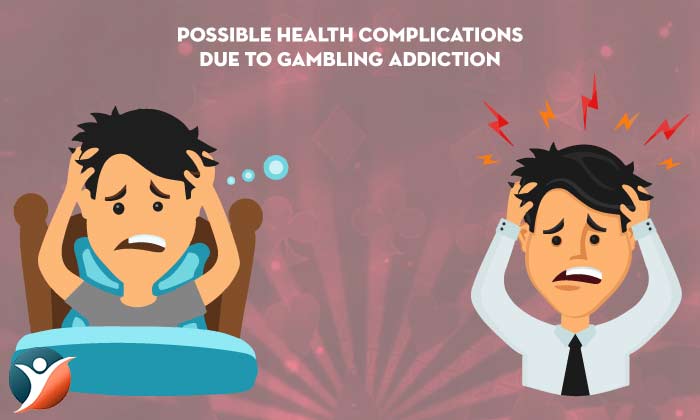
Conclusion
With proper treatment, the prognosis of pathological gambling is quite encouraging. More than half of people with this disorder can easily abstain from problem gambling just within a year after receiving suitable treatment for six weeks. With proper diagnosis, medical intervention and family support, it is possible to get over your gambling addiction. It is important to recognize gambling urges and problem gambling, to break free more quickly from this vicious circle. Few people who are under the recovery process may relapse and gamble again. If you relapse, don’t think that you have failed. This is just a phase in the recovery process, and your recovery may become easier easier.
Did you enjoy reading our article? Did you follow any of the recommendations given below. Leave your recommendations, advice and feedback in the comments section below. We look forward to sharing more information on gambling addiction with you very soon. Keep checking this space out for more on gambling addiction.




